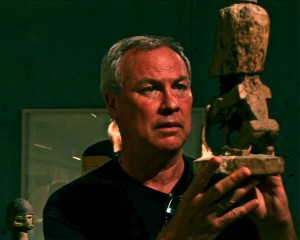Robert Wilson
Born in Waco, Texas, Robert Wilson studied at the University of Texas and the Pratt Institute of Brooklyn. He later apprenticed the painter George McNeil in Paris and worked with the architect Paolo Solari in Arizona.
Beginning in the 60s, he resided in New York City and established the Byrd Hoffman, School of Byrds Foundation. In 1969 he creates his first two shows: The King of Spain at the Anderson Theatre and the Life and Time of Sigmund Freud at the Brooklyn Academy of Music.

Bob Wilson
1971 saw his international breakthrough with Deafman Glance, a work that was highly recommended by the poet Louis Aragon and received worldwide critical acclaim. Other projects are conceived in Europe, the Middle-East (Shiraz, Iran) and in South America. In 1976, he creates the opera Einstein on the Beach in collaboration with Philip Glass, presented at the Avignon Festival and at the Metropolitan Opera in New York.
Following the international success of Einstein on the Beach, Bob Wilson dedicated most of his time to the theatrical and operatic stages of Europe. He worked for the Scala of Milan, for the Bastille opera in Paris, and the Opernhaus in Zurich, all the while pursuing his activity as a set designer in the United States for companies in Chicago and at the Grand Opera in Houston. At the Shaubuhne in Berlin in 1979 and 1987, Robert Wilson developed the first two parts of Death and Destruction in Detroit.
In 1988, Wilson made his first appearance at the Thalia Theatre of Hamburg where he directed Heiner Muller’s Hamlet Machine. One year later, the same theater witnessed his interpretation of Parsifal by Tankred Dorst followed in 1991 by the Parsifal of Richard Wagner in the National Opera of Hamburg.
He followed with the opera Cosmopolitan Greetings in collaboration with Allen Ginsberg and Rolf Libermann. For the Olympic Festival of the arts in 1984 in Los Angeles, Robert Wilson conceived his most ambitious project: The Civil Wars: a tree is best measured when it is down, a theatrical work elaborated with the help of an international group of artists. To this day, this work has never before been presented in its entirety. Spectators of the United States, Europe and Japan have either seen one part or the other.
In 1990, Robert Wilson presented The Black Rider, the first of four musical operas conceived for the Thalia Theatre of Hamburg with the collaboration of the musician Tom Waits and the beat generation veteran William Burroughs. This first show is followed in 1992 by Alice, an adaptation of Lewis Carroll’s novella. In 1996 Robert Wilson collaborated with Lou Reed to create Time Rocker. In addition to theater, the visual arts constitute the second harbor for Robert Wilson’s creativity. His drawings, paintings and sculptures have been presented in hundreds of exhibitions—both individual and collective—throughout the world. His work can be seen in The Museum of Fine Art in Boston, in the Georges Pompidou Center in Paris, in the Museum of Contemporary Art in Houston, the Institute of Modern art in Valence, and the MOMA and Metropolitan Museum of New York. An innumerable amount of prizes and distinctions have crowned his works, among which the Golden Lion of the Venice Biennial for his installation Memory/loss in 1993.
Since 1992, numerous projects have been initiated and developed in the Watermill Center. Among these projects are Memory/Loss, Persephone (which toured internationally in 1995), Monster of Grace (with Philip Glass) world tour in 1993/94, the Human Voice at the Chatelet Theater in 2001, La Galigo at the Purnati Center for the Arts in Bali in 2001/02, and Les Fables at the Comedie Francaise in Paris.
Robert Wilson directed also The Gold of the Rhine and St. John’s Passion at the Chatelet Theater in 2005/2006, Quartet with Isabelle Huppert, Ariel Garcia Valdes at the Odeon Theatre, the Voom Portraits at the Philips de Pury and Paula Cooper galleries in New York and subsequently on world tour, Les Fables for the Lincoln Center Festival, the Three Penny Opera in Berlin and a new work with composer Jo Kondo for the Guggenheim Works and Process, A letter for a Man with Mikhaïl Baryshnikov, Adam’s Passion, Faust Part I part II, Peter Pan, Shakespeare Sonnets…